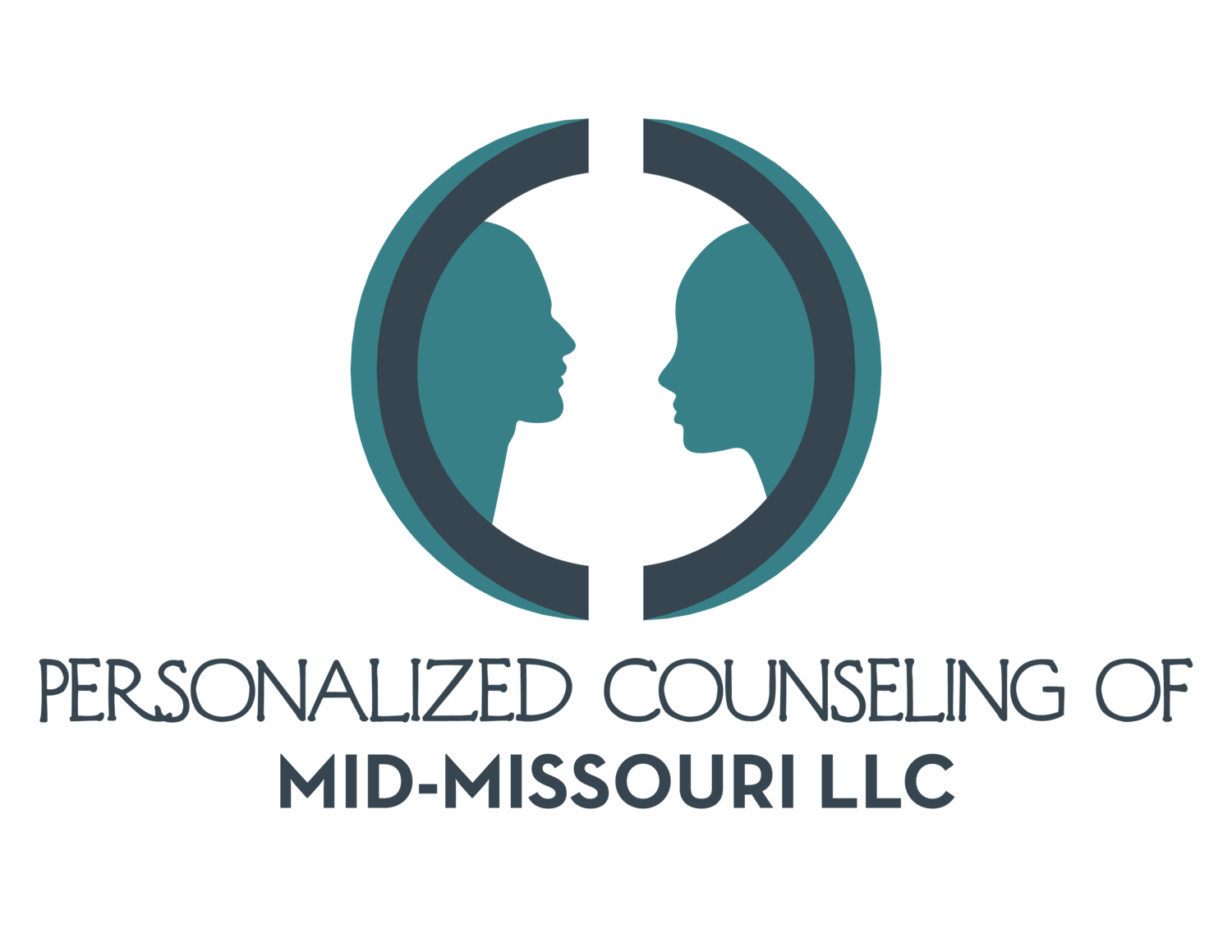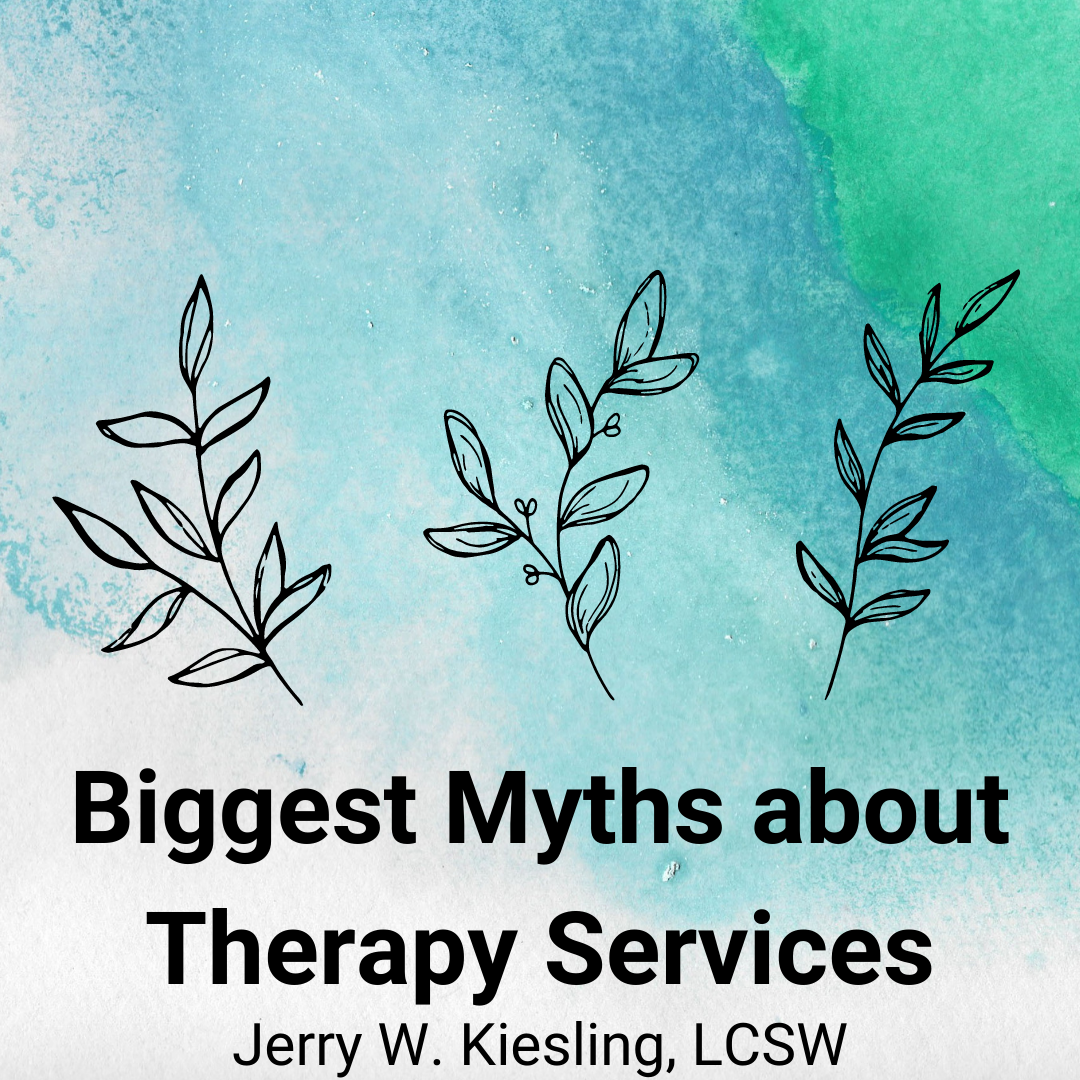Top 7 Myths about counseling, therapy, and psychotherapy in Columbia, MO and Mid-Missouri
Biggest Myths about Therapy Services Blog, Personalized Counseling of Mid Missouri LLC and Jerry W. Kiesling, LCSW
You may have been looking for a therapist, counselor, or psychotherapist in Columbia, MO, for a while. As you know, there are many clinicians in our area. While that can be great, knowing who to choose can be confusing. You may have interviewed a few therapists and know who feels like a good fit. However, you may still have questions about therapy and counseling. That is entirely normal.
Once you decide to start therapy you may still feel some apprehension. It may even be scary to start therapy. I want to help get you the answers you need to overcome this roadblock. I want you to have a better life. Below is a list of common myths some people have about therapy and counseling. While I specialize in helping Seniors, Caregivers, and Adults overcome Depression, Anxiety, and Grief, I want everyone to have the opportunity to grow and have a good life.
I can talk with my friend.
Having a trusted friend is essential. However, your friend may or may not be able to meet you where you are and hold a safe space for you to grow. Having confidentiality, openness, and safety allows you to overcome some thinking that may keep you from digging in deep and growing all you can grow. If you are worried that the person will tell others or judge you, you may only share the safe things. Sharing more of the story and understanding how it affects you is where much of the growth happens in counseling. A counselor or therapist will provide a safe and confidential space for you to be open. Often individuals attending therapy discover themselves in a unique way that only a safe place provides.
I must use my insurance.
You may or may not have insurance. If you have insurance, it may have a benefit for counseling. Having insurance doesn’t necessarily mean you MUST use it. You may make the decision, after interviewing several therapists, to work with a therapist who is Out Of Network (OON). Finding the best fit and someone you trust can be worth the cost. Having the right clinician with you on this journey can make a big difference. If you choose not to use your insurance, your therapist won’t share the records with the insurance carrier, and that may give you an added layer of protection and safety. You will have to decide how important it is to have others reading your records.
Psychotherapy just won’t work for me.
Individuals who are tired of hurting and want to heal usually will! Knowing your WHY for starting therapy can allow you to feel a sense of direction and a specific goal. In other blogs, I have encouraged others just to take out a sticky note and write down 10 reasons they want to stop hurting. You may also want to write down several ways your life may be different if the hurt went away or was managed. Keep this sticky note handy throughout your counseling journey and refer to it regularly. Don’t forget your WHY!
Counseling will change me into someone I don’t want to be.
Your psychotherapist will work with you to identify the ways you want to change. The clinician will often teach you about several skills and ways of changing. Trying the techniques can allow you to see if they are a fit for you. If it doesn’t feel right, it could be your mind and body telling you it isn’t a good fit. This feeling is always something you and your therapist can process during the sessions. It could lead you to greater insight into why a technique feels odd or confusing. Just know that you can keep the changes that fit and make sense to you! Those are the changes that will last the longest anyway.
Others will know I am in therapy and think I am broken or sick.
Your counselor will keep your visits confidential unless you are likely to harm yourself or someone else. Otherwise, others will only know if you tell them. However, at times it may feel like you are keeping a secret and make you feel uncomfortable. Processing this uncomfortable feeling with your therapist can help you make a good decision about who to tell and what to say.
I will have to go to therapy for a long time.
The goal of therapy is to help you build skills and techniques that help you succeed after therapy ends. From the first visit, your therapist will talk with you about the process of “Termination,” ending therapy. Many individuals attend therapy for several weeks or a few months, while others may decide they need a more extended period of therapy. Your journey will be unique. Give yourself the grace to stay as long as YOU need.
My therapist will tell me what to do.
Your therapist will offer suggestions and insights as you attend therapy. However, the therapist will wait for you to decide what you want to do. After all, this is a journey that may be new and take some time. The goal is to make changes as your confidence, comfort, and sense of safety increases. I would never want you to jump in the deep end of the pool before you can swim. Everyone will feel this sense of readiness to change at a different time. You may think it would be easier if your therapist just told you what to do, but no one knows what will work but you, try to trust that if you can.
Therapy helps people with bigger problems than mine. I don’t need therapy. If I go to counseling, I am just weak.
The goal of therapy is always to help individuals grow and live a life where thoughts, feelings, and behavior have a lessened impact on everyday life. Having resentment, anger, sadness, hopelessness, and fear can affect daily life and are worth managing. Sometimes our anxiety can be high functioning, and you may not significantly impact your everyday life. However, it may look more like stress, perfectionism, being on-guard all the time, and it can be exhausting. These feelings are not hearing voices or acting out, but they may merit working through and improving your day-to-day life. Working on yourself is always a courageous venture. It may take you moving out of your comfort zone and allowing yourself to be vulnerable. It takes strength and courage to make this move.
Therapy is a quick fix.
Therapy can take from several weeks to several months. It usually isn’t a quick fix. Very few people attend one session and feel like their life is where they want it to be. Think about this as a journey. Sometimes it will be uphill, and at other times it will feel like coasting. It may take a bit to see the changes that you need in your life. Some people may do counseling for a while and then take a break. After a rest, they may return to therapy a few months or years later. The growth you achieved in past counseling doesn’t go away. It serves as a foundation for future growth. If you have been to therapy before and are thinking about returning, please don’t feel you failed. Know that we grow and change when our mind and body can accept the changes. Now maybe your time to grow again!
Men won’t benefit from counseling.
Remember your WHY? Most people struggling with feelings, thoughts, and behaviors that get in the way of everyday life will have a WHY. This WHY can allow almost everyone to work toward their goals. Sometimes certain people are more in-tune with their feelings, making it easier to talk and share. But all of us can hurt, get angry, resent things, and feel down or blue. If you are a man and feel uncomfortable sharing your situation, it is vital to work through this with your therapist.
The counselor will just put me on medications.
Counselors don’t prescribe medications. However, if you and your therapist work together and think medicine will work for you, talking with your Primary Care team is the first step. Your counselor can work with you on thinking about questions to ask and working with you through the awkwardness that may be present when talking with your Healthcare Provider about this topic.
All the counselor will do is tell me everything that is wrong with me.
Most counseling considers your strengths as well as your challenges. Everyone will bring a unique set of strengths to the counseling journey, and reusing these strengths can make a difference in your healing. Often we obtain our strengths because we made it through a tough time in the past, and we figured out what works for us in that situation. Remembering these skills during therapy can propel you to make the changes you want. Rediscovering your strengths can be a very positive time during counseling.
Finding the right therapist in Columbia, MO, can take a little time, but I hope you find someone that is a great fit! If you are still feeling stuck, feel free to call me at (573) 238-8575 for a free 15-minute phone consultation. I’d be happy to hear about what is happening and help direct you to the right person. If you are a Senior, Caregiver, or Adult with Depression, Anxiety, or Grief, you can read more about how I can help at www.counselingmidmo.com.

